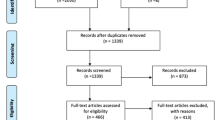Abstract
Examine the unmet needs of people with serious mental illness (SMI) from the perspective of certified peer specialists. 267 certified peer specialists from 38 states completed an online survey (female [73%], 50.9 [SD = 12] years, and non-Hispanic White [79.8%]). Many respondents reported a primary mental health diagnoses (n = 200), 22 respondents reported their diagnosis as schizophrenia spectrum disorder (11%), 46 respondents reported bipolar disorder (22.1%), 47 respondents reported major depressive disorder (22.6%), 29 respondents reported post-traumatic stress disorder (13.9%), 27 respondents reported alcohol/substance use disorder (13%), 2 respondents reported personality disorder (1%), and 12 reported “other” (5.8%). A mixed methods convergence analysis integrated quantitative with qualitative data. Social isolation (n = 160, 59.9%) and feeling lonely (n = 159, 59.6%) were the most highly endorsed unmet need, followed by the need to address chronic health conditions (n = 80, 30%), prevent mental health hospitalization (n = 71, 23.6%), and prevent drug use (n = 66, 24.7%). Four themes emerged: need to address basic necessities, loneliness and social isolation, hope, and addiction. Addressing loneliness and social isolation were identified as the primary unmet needs among people with SMI. Addressing co-morbid health conditions may simultaneously impact other unmet needs. Hope is an important intervention target. Initial insights from this study can be used to guide researchers’ efforts to incorporate certified peer specialists perspectives in developing programs to meet the needs of people with SMI. Future research using participatory research methods can further examine these initial insights.
Similar content being viewed by others
References
Stroul BA: Community support systems for persons with long-term mental illnesses: a conceptual framework. Psychosocial Rehabilitation Journal 1989;12(3):9–26.
National Institutes of Health. The all of us research program announces first community partner awards Available at: http://www.nih.gov/news-events/news-releases/all-us-research-program-announces-first-community-partner-awards. Accessed 10 Jan 2019.
Bason C. Leading public sector innovation: co-creating for a better society. Bristol: Policy Press; 2010.
Creswell J. Qualitative inquiry and research design: choosing among five approaches. 2nd ed. Thousand Oaks: Sage; 2007.
Martin P, Turner B. Grounded theory and organizational research. J Appl Behav Sci. 1986;22:141–57.
Perese E, Wolf M. Combating loneliness among persons with severe mental illness: social network interventions' characteristics, effectiveness, and applicability. Issues Ment Health Nurs. 2005;26:591–609.
Ong A, Rothstein J, Uchino B. Loneliness accentuates age differences in cardiovascular responses to social evaluative threat. Psychol Aging. 2011;27:1.
Institute of medicine (US) division of health promotion and disease prevention. In: Berg RL, Cassells JS, editors. The second fifty years: Promoting health and preventing disability. Washington (DC): National Academies Press (US); 1992.
Badcock J, Shah S, Mackinnon A, et al. Loneliness in psychotic disorders and its association with cognitive function and symptom profile. Schizophr Res. 2015;169:268–73.
Linz S, Sturm BA. The phenomenon of social isolation in the severely mentally ill. Perspect Psychiatr Care. 2013;49:243–54.
Walker E, McGee R, Druss B. Mortality in mental disorders and global disease burden implications: a systematic review and meta-analysis. JAMA Psychiat. 2005;72:334–41.
Druss B, Singh M, von Esenwein S, et al. Peer led self-management of general medical conditions for patients with serious mental illnesses: a randomized trial. Psychiatr Serv. 2018;69:529–35.
Substance Abuse and Mental Health Services Administration. (2018). Key substance use and mental health indicators in the United States: Results from the 2017 National Survey on Drug Use and Health (HHS Publication No. SMA 18–5068, NSDUH Series H-53). Rockville, MD: Center for Behavioral Health Statistics and Quality, Substance Abuse and Mental Health Services Administration. Retrieved from https://www.samhsa.gov/data/. Accessed 10 Jan 2019.
Fortuna K, Aschbrenner K, Lohman M, et al. Smartphone ownership, use, and willingness to use smartphones to provide peer-delivered services: results from a national online survey. Psychiatry Q. 2018;89:947–56.
Salzer M, Schwenk E, Brusilovskiy E. Certified peer specialist roles and activities: results from a national survey. Psychiatr Serv. 2010;61:520–3.
Chinman M, McInnes DK, Eisen S, et al. Establishing a research agenda for understanding the role and impact of mental health peer specialists. Psychiatr Serv. 2017;68:955–7.
Fortuna K, Barr P, Goldstein C, Walker R, Brewer L, Zagaria A, et al. Application of community-engaged research to inform the development and implementation of a peer-delivered mobile health intervention for adults with serious mental illness. J Participat Med. 2019;11(1):e12380. https://doi.org/10.2196/12380.
Funding
This study was funded by the Health Promotion Research Center at Dartmouth, funded by a grant from the United States Centers for Disease Control and Prevention (Cooperative Agreement U48 DP005018). Additional support was received from the National Institute of Mental Health (T32 MH073553–11). The funders had no role in study design, data collection and analysis, decision to publish, or preparation of the manuscript.
Dr. Muralidharan is supported by VA Rehabilitation Research and Development Career Development Award IK2RX002339.
Author information
Authors and Affiliations
Corresponding author
Ethics declarations
Conflict of Interest
All authors declare that he/she has no conflict of interest.
Ethical Approval
All procedures performed in studies involving human participants were in accordance with the ethical standards of the institutional and/or national research committee and with the 1964 Helsinki declaration and its later amendments or comparable ethical standards.
Informed Consent
Informed consent was obtained from all individual participants included in the study.
Disclosure
The views expressed in this article are those of the authors and do not necessarily reflect the position of policy of the Department of Veterans Affairs or the United States government.
Additional information
Publisher’s Note
Springer Nature remains neutral with regard to jurisdictional claims in published maps and institutional affiliations.
Rights and permissions
About this article
Cite this article
Fortuna, K.L., Ferron, J., Pratt, S.I. et al. Unmet Needs of People with Serious Mental Illness: Perspectives from Certified Peer Specialists. Psychiatr Q 90, 579–586 (2019). https://doi.org/10.1007/s11126-019-09647-y
Published:
Issue Date:
DOI: https://doi.org/10.1007/s11126-019-09647-y




